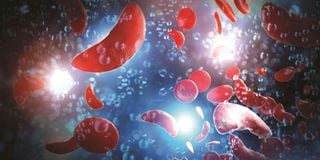Doc, can I prevent my newborn from inheriting sickle cell disease?

Globally, it is estimated that sickle cell disease (SCD) accounts for between six and 15 percent of deaths among children aged less than five.
What you need to know:
- The main challenges with sickle cell disease are:
- The abnormal haemoglobin is inefficient in carrying blood.
- It also causes the red blood cells to have a different shape (sickle shape) instead of the normal round discs, and they are destroyed more easily, leading to low blood levels (anaemia).
Hi doctor,
Can a woman bear a child who does not have sickle cell after having one who is a sickler? Both partners are carriers but they would love to have other children. Mercy
Dear Mercy,
Sickle cell disease is an inherited disorder of the blood, where the body produces abnormal shaped haemoglobin called haemoglobin S, which is the protein in the red blood cells that carries oxygen. The main challenges with sickle cell disease are:
The abnormal haemoglobin is inefficient in carrying blood.
It also causes the red blood cells to have a different shape (sickle shape) instead of the normal round discs, and they are destroyed more easily, leading to low blood levels (anaemia).
In addition, the abnormally shaped red blood cells are hard and sticky and do not move as easily through the blood vessels, and can end up clustered together in the smaller blood vessels, causing reduced or complete blockage of blood flow in that area. This leads to pain and tissue destruction in the affected areas and increased risk of infection.
The abnormal haemoglobin S develops due to the inherited genes. There are different types of sickle cells disease depending on the types of abnormal haemoglobins produced by the body. In the most common type of sickle cell disease, the genes inherited from both parents code for haemoglobin S, so the red blood cells have 2 haemoglobin S (called HbSS). Rarely, an individual may have two different types of abnormal haemoglobin, having inherited S from one parent, and another type from the other parent such as HbS Beta thalassemia; HbSC, HbSD, HbSE, HbSO.
An individual may also have the sickle cell trait (commonly known as carrier). This means that they inherited the gene that codes for haemoglobin S from one parent and one that codes for the normal haemoglobin A, from the other parent. The haemoglobin profile for this person is indicated as HbAS.
If the two parents are carriers, with each pregnancy, the chances of getting a child with normal haemoglobin (HbAA) is 25 per cent. Chances of getting a child with sickle cell trait (HbAS) is 50 per cent and getting a child with sickle cell disease (HbSS) is 25 per cent. These chances remain the same regardless of the status of previous children. It is advisable for you, your partner and your child to be followed up by a haematologist and enroll for genetic counselling to better understand the risks, early diagnosis and management of the disease, and also receive psychological support, both in one-on-one and in group sessions. In addition to the measures for disease management, stem cell transplant can also be done for the child with sickle cell disease, as it has a high success rate for cure.
Dear doctor,
Is it good to cleanse your body through fasting once in a while?
Jerry
Dear Jerry,
The body is generally well equipped to cleanse itself daily through the action of the liver, the kidneys and the gastrointestinal tract, and also through the skin and the lungs. These organs process what is put in the body and get rid of what is not needed. An individual can interfere with this function or make it more challenging by consuming foods and drinks that are unhealthy among other unhealthy habits.
The best way to support the body in the function of cleansing and eliminating toxins is by maintaining healthy practices and cutting out unhealthy practices. This includes:
-Taking adequate water daily
- Eating regular and adequate balanced meals with a variety of unprocessed food, complex starches, legumes, nuts, seeds, lean proteins, fruits and vegetables.
Regular and adequate exercise
Adequate sleep
Healthy stress management
Cutting down on excess sugar and salt
Reducing alcohol to one drink (for females) or two drinks (for males) per day.
Reducing caffeine intake so that the amount taken does not cause side effects like jitteriness, insomnia or hyperacidity
In a more health conscious society, there are multiple practices currently available in the form of diets, fasts and cleanses. The benefits awaken health consciousness and may provide the motivation needed to adopt healthier habits. For the duration of the process, they also eliminate unhealthy foods and drinks. However, there are risks associated with many fasts, cleanses and extreme diets:
There is no scientific data to support use of external means to cleanse the body
Some of the cleanses are potentially dangerous such as colonic cleanses through flushing or unnecessary use of laxatives
Fasting beyond a day or two starves the body of necessary nutrients, minerals and electrolytes. Severe dietary restriction and prolonged fasting also depletes the liver of proteins that it needs to naturally cleanse the body.
Most cleanses do not indicate what is being cleansed from the body. Another challenge is lack of regulation for these products/processes. There may be no prescription specific to the individual and no regulation for the prescribers of these products.
Weight loss from severe dietary restrictions and extended fasting is usually a short term benefit. There’s resumption of normal or increased appetite and craving immediately after, and there may also be increased stress during the process as the body works hard to suppress normal hunger and cravings. The body metabolism slows down during the duration of the fast and future weight loss becomes more difficult.
The best way to cleanse the body and keep it healthy is by adopting and maintaining a healthy lifestyle in the long term.
Send your questions to [email protected]




